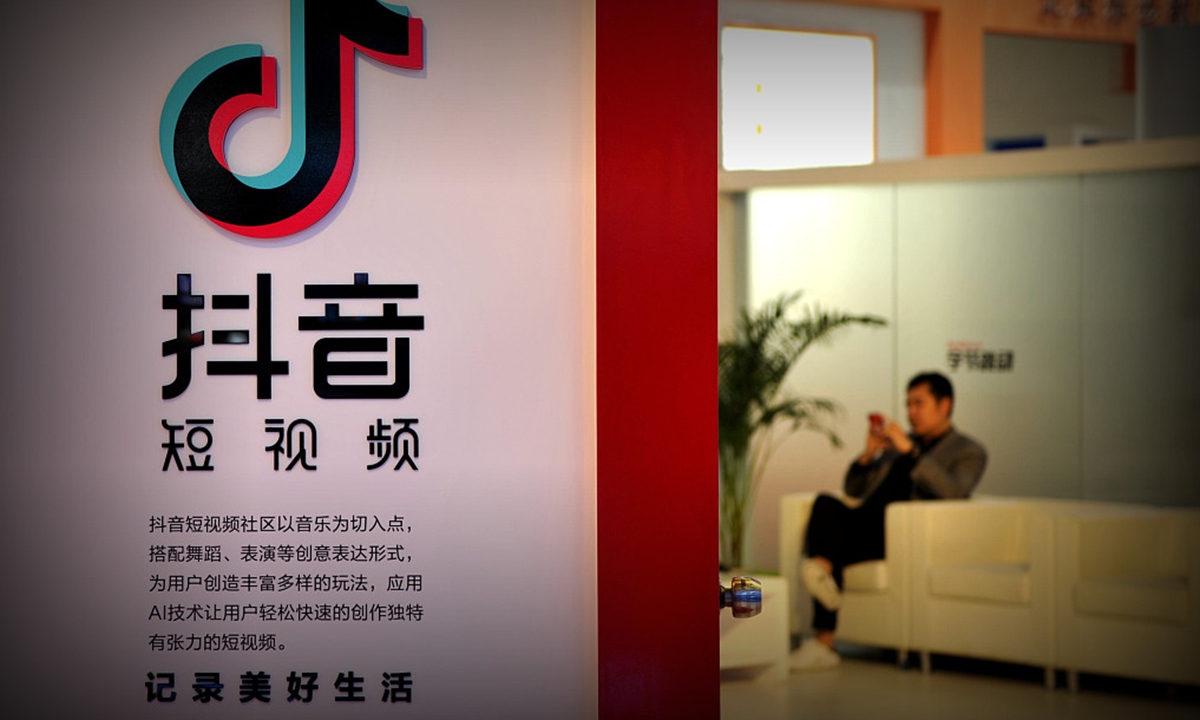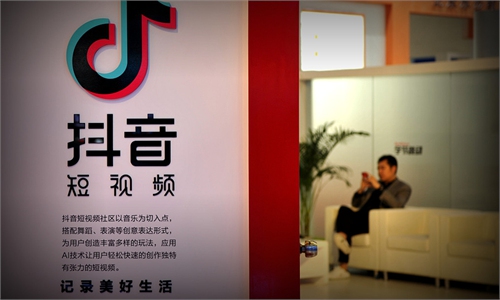
Douyin Photo:VCG
Short video platform Douyin, the Chinese version of TikTok owned by ByteDance, confirmed to the Global Times on Tuesday that it has filed a lawsuit with the Beijing Intellectual Property Count (BIPC) against what it claims is a monopoly by Tencent.
Douyin stated that Tencent blocked users from sharing content from Douyin on its social networking platforms WeChat and QQ, and such a move constituted "the monopoly of abusing market domination as well as excluding and restricting competition," which is regulated under China's anti-monopoly law.
As such, Douyin asked the court to order Tencent to stop the practice, publish a statement removing its negative impact, and compensate Douyin's economic losses and reasonable expenses totaling 90 million yuan ($13.9 million).
In response, Tencent said in a statement sent to the Global Times Tuesday that ByteDance's move is "maliciously framing it" and the company will sue ByteDance for illegal infringement.
"The accusation from ByteDance is absolutely inconsistent with the facts… We have provided service for users and third-party products based on fair competition, openness and cooperation," Tencent said. The company said it has not received relevant documents on Douyin's complaint.
Douyin said in the filing to BIPC that monthly active users of WeChat and QQ have surpassed 1.2 billion and 600 million, respectively, and to date, there is no other operator in the market that could provide corresponding services such as those of Wechat and QQ.
Douyin said this shows Tencent has "a market dominating position," news website thepaper.cn reported.
Douyin claimed that Tencent's blockage against Douyin not only hurts users' rights, but also disrupts the normal operations of Douyin's products and services, and eliminates and restricts market competition, the report said.
"The move hinders technological progress and innovation, and does not contribute to improving economic efficiency and social welfare at all. It only helps [Tencent] distort competition in other areas and consolidate its market position," Douyin said.
Tencent stated that the court has ordered a number of ByteDance's products, including Douyin, to immediately stop infringement for "acquiring WeChat users' personal information in an unfair competitive way and violating platforms' rules."
"ByteDance and its relevant companies also practice a number of illegal and infringement behaviors that hurt platforms' ecosystems and users' rights. We will continue with legal action," Tencent said.
In response to Tencent's claims, Douyin said in a statement to the Global Times late on Tuesday night that there is no basis for what Tencent claimed was "maliciously framing."
"The fact is that Tencent blocked Douyin and relevant products for more than three years, involving hundreds of millions of users for 'short video remediation.' But during that time, Tencent has launched more than 10 short video products," the statement noted.
It also defies Tencent's claim on Douyin's illegal acquiring personal information of Wechat users, noting that such argument is based on Tencent's thoughts of users' data as its commercial resources.
"Currently, China is strengthening the implementation of anti-monopoly and anti-unfair competition. We hope the suit to clear how internet economy competes in a regulated way and improve anti-monopoly and anti-fair competition mechanism," said the statement.
The lawsuit comes as Tencent-backed short video platform Kuaishou Technology has sought to raise as much as $5.4 billion in the world's biggest internet IPO at the Hong Kong stock exchange this week.
Douyin revealed in November 2020 that its daily active users have reached 600 million.
Its main investors include Kohlberg Kravis Roberts, SoftBank Group, Sequoia Capital, General Atlantic, and Hillhouse Capital Group.


